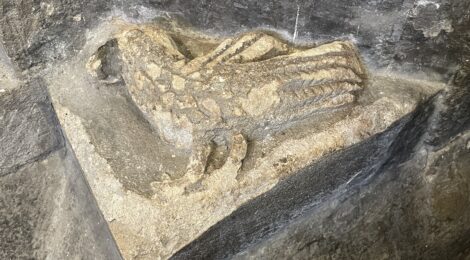
SERMON for Boniface
A sermon preached at St, Mary’s (Iffley, Rose Hill & Donnington) by Graham Low on 5th June 2024
As Jesus addressed the Sadducees in today’s gospel passage he bluntly told them that they knew neither the scriptures, nor the power of God. God is God not of the dead but of the living. From what we know of the martyr Boniface, he was a person who knew both the scriptures and also the power of God. So a few words about this remarkable man.
Boniface was born in Crediton in Wessex, today’s Devon, in 671, and was called Wynfrith until much later in his life. He entered the monastic life in Exeter and later moved to Nursling, near Southampton, where he became a gifted scholar and poet. He specialised in Biblical exposition and later compiled the first Latin grammar written in England.
In 701 Wynfrith was ordained and soon made his name with the leaders of Wessex; thus began a promising career. But in 718, Wynfrith decided to leave England, never to return. He began work among pagan tribes in Frisia (in the borders between present day Nederlands and Germany). There was much hostility to his work, and so he was offered the post of Abbot of Nursling. He refused to return. Instead, three journeys to Rome led to his appointment by Pope Gregory II to preach to the unconverted in Bavaria (around present day Munich) and Hesse (around present day Frankfurt). This was very fruitful and the Pope consecrated him as a missionary bishop. Later he returned to Frisia and his ministry there was judged a great success.
From then on he committed his life to work in Frisia. He was described as fearless and on one occasion felled a sacred oak tree dedicated to the worship of Thor. The lack of retribution by Thor led many people to convert to Christianity. He founded several monasteries and also made a commitment with the Frankish King to reform corrupt clergy, with regional councils set up to make clergy more accountable. He worked tirelessly to improve relationships between church and state and was once said to have been the most influential Englishman in the history of Europe. In 747 he was made Archbishop of Mainz, but resigned after five years and returned to Frisia to continue his missionary work. Even in his eighties he continued to strive for the spreading of the gospel and for the purity of the church. In 754 he was attacked in Dokkum by a group of pagan bandits and was killed.
Boniface was a person who was fiercely determined to press ahead with the tasks of evangelism and church order, even though he was at times much discouraged. Nevertheless, he was responsible for the conversion of many people as well as organising and installing effective leadership within the church throughout Europe.
Crediton-born Winfrith, who became Saint Boniface, is the Patron Saint of Crediton, following approval some years ago by Crediton Town Council. In 2019, following a vote by Devon County Council and after much campaigning and support from religious leaders he became patron Saint of Devon. He is also said to be patron saint of brewers, tailors, and file-cutters. In addition he is the patron saint of Germany.
Qualities of his life – promoting church – state relationships, as well as spreading the gospel and evangelism are vitally important issues for the church today.
I end with some words by Hildegard of Bingen
O Boniface
The living light saw you
Like a wise man
Who returned to their source
The pure waters flowing from God
When you watered the greenness of the flowers.
So you are the friend of the living God
And the true crystal shining
In the benevolence of the straight way
where you ran wisely.
Amen.





